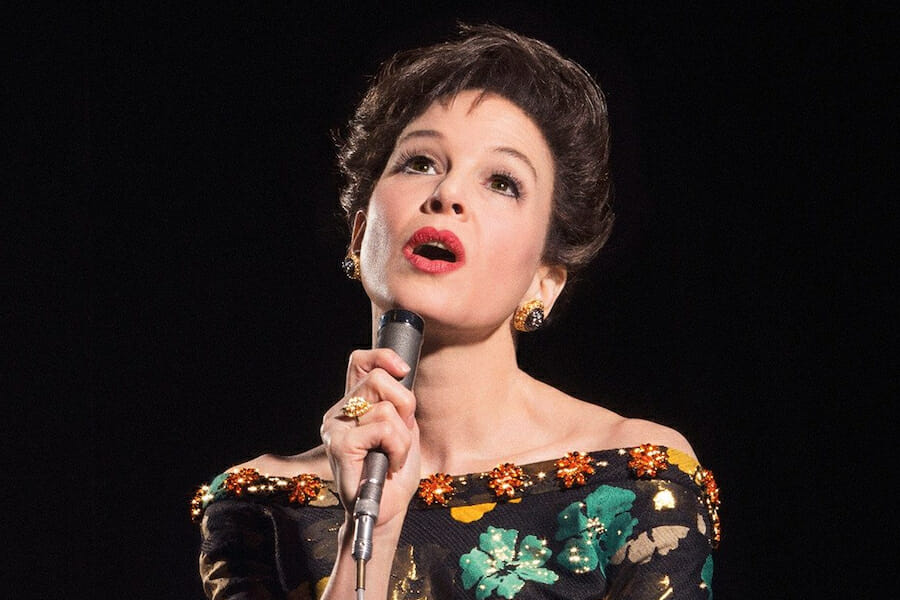
‘Judy’ Review
It’s been 80 years since The Wizard of Oz was released and 50 years since Judy Garland died. So why do we still care so much? Of course the obvious reason is that, for many generations, her adventures as Dorothy Gale from Kansas marked the first time many of us kids could put ourselves in the shoes (mine weren’t ruby sparkles) of a lead character in a movie. Her fantastical journey ignited our imaginations and whisked us away to fight witches and flying monkeys while making wonderful friends in a corn patch and enchanted forest. Oh, and that voice! However, there is another side to this coin. Judy’s story is also an example of the dark and tarnished side of Hollywood…she pulled back more than one curtain.
Renee Zellweger (Oscar winner for Cold Mountain, 2003) stars as Judy Garland, and her performance will likely put her in line for her fourth Oscar nomination. The film basically covers the last year of Judy’s life, and director Rupert Goold (True Story, 2015) is working from a script by Tom Edge adapted from Peter Quilter’s stage play, “End of the Rainbow.” There is no Lollipop Guild here. Instead, the harsh realities of Judy’s life are explored. The film opens with Judy and her kids, Joe and Lorna, performing on stage…and then being unceremoniously denied a room at a nearby luxury hotel. See, Judy’s career is in a bad way (admittedly undependable and uninsurable) – as is her health. She is broke, has no home, and offers for roles or performances have dried up. She ends up at her ex-husband Sid Luft’s (Rufus Sewell) home, which after some former-spouse bickering, is where the kids stay.
With no other real prospective gigs, Judy accepts an offer from Bernard Delfont (Michael Gambon) to perform at his Talk of the Town theatre in London. Most of the film covers her time in London, and the challenges for all involved. She’s 46 years old in the winter of 1968, and though her voice no longer carries the sublime purity of those early years, Judy still has incredible stage presence and an ability to connect with the audience. The challenges occur for her assigned assistant Rosalyn Wilder (who served as a consultant on the film, and is played here by rising star Jessie Buckley), as well as Judy herself. She misses her kids, and is battling loneliness and an addiction to pills – causing her to rarely eat or sleep. When her “friend” (and fifth husband) Mickey Deans (Finn Wittrock) shows up, Judy’s attitude perks up, but her already questionable dependability falters.
Flashbacks to Judy’s teenage years at MGM are used to portray how the studio and industry took control of her body, soul, and career. Watching studio head Louis B. Mayer (Richard Cordery) bully young Judy (played by newcomer Darci Shaw) by pretending to be a father figure while keeping her weight in line with a diet of cigarettes, diet pills, and soup, is just painful.
These scenes, including those with young Judy’s frequent co-star Mickey Rooney, help us understand why she was in such a state by the time she hit London. Ms. Zellweger embodies the blend of frailty and determination and talent, as well as the insecurities that simultaneously drove Judy and held her back. Of course, few singers have ever possessed the vocal talent of Judy, but Zellweger admirably brings the appropriate strain and pain to the songs she sings for the movie, including “By Myself” and “The Trolley Song.”
Born Frances Ethel Gumm, Judy Garland first hit the stage at age 2, and never experienced a “normal” childhood or traditional relationship. Despite her immense talent, she was never able to find peace with the pressures of performing. Years of abuse led to an early death, not long after she finished her London run. The film never backs away from the tragic story, but also allows one of the brightest stars of an era to shine through. For those who only know Judy as that homesick girl from Kansas, or maybe also as the rosy-cheeked youngster on the Trolley in the holiday favorite Meet Me in St. Louis (directed by her future husband Vincente Minnelli), there is likely a shock factor in seeing the broken icon in middle age. The film also deals with that always-present bond she had with her audience, especially with the gay community – although a certain sequence of the film seems quite improbable.
For a film like this to work (it was not sanctioned by Judy’s daughter Liza Minnelli), it all rides on the lead performance. Renee Zellweger beautifully captures both the tragic essence and the stunning talent of the late 1960’s Judy Garland, an iconic and revered entertainment figure. The film allows us to understand the lifelong mistreatment and heartbreak of this woman, as well as the strength and joy she received while performing live. Balancing the “early” Judy with the “later” Judy was a brilliant way of bringing her life full circle. Ms. Zellweger’s performance goes so much deeper than singing on stage…she embodies the insecurity and frailties of a woman who was never afforded the opportunity to live her own life.

